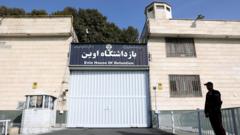After 12 days of intense conflict, both nations agree to a cease-fire mediated by the U.S., aiming to prevent further military escalation and loss of life.
**Cease-Fire Agreement Between Israel and Iran: A Turning Point in Middle East Tensions**

**Cease-Fire Agreement Between Israel and Iran: A Turning Point in Middle East Tensions**
The truce announced by President Trump marks a significant halt in escalating violence between Israel and Iran, raising hopes for peace in the region.
---
**Live Updates June 24, 2025**
In a monumental development early Tuesday morning, both Israel and Iran declared a cease-fire, putting an end to 12 days of fierce fighting that had raised alarm bells about a potential wider war in the Middle East. The truce was first announced by President Trump, who cautioned all parties against violating it. Iranian officials confirmed their acceptance shortly after.
On the ground in Israel, the aftermath of Iranian missile strikes has been devastating, with the death toll recently reaching four. Emergency responders continue to rush to areas affected by missile attacks, as the Israeli military indicates that poverty-stricken regions have been severely hit. Footage shared by Israeli emergency services shows damaged buildings and wrecked vehicles, highlighting the conflict's toll on civilian life.
Despite the cease-fire announcement, reports of immediate attacks from both sides created skepticism about the viability of the agreement. In Beersheba, surveillance footage captured a missile strike that left significant destruction. The Israeli military declared an all-clear signal after two hours of missile fire, but went on to advise citizens to stay vigilant due to continued threats.
As international communities react to these developments, the role of the U.S. in mediating peace has become increasingly significant. Trump emphasized the need for both nations to adhere to the cease-fire and acknowledged the involvement of Qatar in facilitating talks. However, ongoing military operations depict a complex and precarious path toward lasting peace.
Iran's prior warnings before missile attacks appear to have been a calculated strategy, allowing not only for a show of military strength but also for a potential exit from the conflict without escalating into full warfare with the U.S.
Meanwhile, the Israeli military continues to counteract threats, with operations taking place in various locations to neutralize perceived Iranian aggression. Analysts warn that even with a cease-fire, tensions will remain high, and the political landscape will influence future interactions between the two nations.
The cease-fire marks a turning point that holds the potential for diplomatic discussions to flourish, though uncertainty lingers in the air as both Iran and Israel navigate the delicate structure of mutual agreements and past grievances.
**Live Updates June 24, 2025**
In a monumental development early Tuesday morning, both Israel and Iran declared a cease-fire, putting an end to 12 days of fierce fighting that had raised alarm bells about a potential wider war in the Middle East. The truce was first announced by President Trump, who cautioned all parties against violating it. Iranian officials confirmed their acceptance shortly after.
On the ground in Israel, the aftermath of Iranian missile strikes has been devastating, with the death toll recently reaching four. Emergency responders continue to rush to areas affected by missile attacks, as the Israeli military indicates that poverty-stricken regions have been severely hit. Footage shared by Israeli emergency services shows damaged buildings and wrecked vehicles, highlighting the conflict's toll on civilian life.
Despite the cease-fire announcement, reports of immediate attacks from both sides created skepticism about the viability of the agreement. In Beersheba, surveillance footage captured a missile strike that left significant destruction. The Israeli military declared an all-clear signal after two hours of missile fire, but went on to advise citizens to stay vigilant due to continued threats.
As international communities react to these developments, the role of the U.S. in mediating peace has become increasingly significant. Trump emphasized the need for both nations to adhere to the cease-fire and acknowledged the involvement of Qatar in facilitating talks. However, ongoing military operations depict a complex and precarious path toward lasting peace.
Iran's prior warnings before missile attacks appear to have been a calculated strategy, allowing not only for a show of military strength but also for a potential exit from the conflict without escalating into full warfare with the U.S.
Meanwhile, the Israeli military continues to counteract threats, with operations taking place in various locations to neutralize perceived Iranian aggression. Analysts warn that even with a cease-fire, tensions will remain high, and the political landscape will influence future interactions between the two nations.
The cease-fire marks a turning point that holds the potential for diplomatic discussions to flourish, though uncertainty lingers in the air as both Iran and Israel navigate the delicate structure of mutual agreements and past grievances.





















